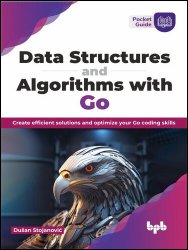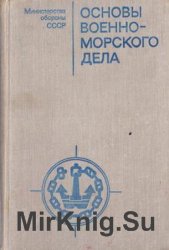 Название: Data Structures and Algorithms with Go: Create efficient solutions and optimize your Go coding skills
Название: Data Structures and Algorithms with Go: Create efficient solutions and optimize your Go coding skillsАвтор: Dušan Stojanović
Издательство: BPB Publications
Год: 2024
Страниц: 188
Язык: английский
Формат: pdf, epub, mobi
Размер: 10.1 MB
Dive into the endless possibilities of data structures and algorithms and have fun doing it.
Key Features:
- Become familiar with common data structures.
- Learn and understand the most popular algorithms through practical examples.
- Recognize when a particular data structure or algorithm should be used to create an efficient software solution.
Description:
Go, designed by Google, is a modern, open-source language known for its simplicity, readability, and efficiency. It excels at building web applications, network tools, and cloud services. Its clear syntax and built-in concurrency features make it a popular choice for modern developers. This guide simplifies the basics by introducing arrays, lists, stacks, queues, maps, trees, and graphs in a practical way. Get hands-on experience, understand essential operations, and compare strengths and weaknesses. Perfect your skills with searching, sorting, and efficient data retrieval techniques. Traverse graphs and trees with ease, all illustrated in the Go code for real-world application, and conclude with insights for ongoing learning. After reading this book, the reader can determine when and why specific data structures should be used and when an algorithm best fits the actual problem’s solution.
Building a modern software solution can be a complex task that requires a comprehensive understanding of the latest technologies and the core of the problem. Knowing which data structure to use or some algorithm that can save resources and increase the solution’s performance becomes essential. In addition, programming languages like Go are powerful tools that have become increasingly popular in software development.
This book is designed to provide a comprehensive guide for the most common data structures and the algorithms that can be executed on them. Everything will be followed with implementation in the Go programming language. Go’s standard library offers completed implementations for some data structures (and algorithms). For others, everything will be developed from scratch. Numerous practical examples and illustrations will be provided to help you understand the concepts explained in each chapter.
This book is intended for developers familiar with the Go programming language who want to learn how to use it to implement algorithms. It is also helpful for developers who want to expand or refresh their knowledge of data structures and algorithms and improve their skills in building software solutions.
With this book, you will gain the knowledge and skills to become a proficient developer and recognize which data structure (or algorithm) suits a specific problem. I hope you will find this book informative and helpful.
What you will learn:
- Decide which data structure is the most suitable for a particular problem.
- Implement different algorithms with the Go programming language.
- Recognize which algorithm is best suited for certain scenarios.
- Utilize data structures and algorithm implementations from Go’s standard library.
- Learn how real-life problems can be solved and simulated.
Who this book is for:
The book targets beginners and experienced developers who want to learn how to implement particular algorithms. It is also helpful for developers who wish to expand their knowledge of data structures and algorithms.
Chapter 1: Fundamentals of Data Structures and Algorithms – This chapter introduces the reader to the concepts of data structures and algorithms. Some of the fundamentals that will be explained are characteristics of data structures, how data structures are represented in memory, how algorithms can be described, and how algorithms can be categorized. Furthermore, the chapter also gives a short history of algorithms and explains how algorithms and data structures are connected.
Chapter 2: Arrays and Algorithms for Searching and Sorting – This chapter presents a detailed overview of arrays (and slices as special types of arrays) and basic array operations. Furthermore, sorting and searching algorithms will be shown, with detailed implementations and comparisons. This chapter will also tackle the subject of multidimensional arrays.
Chapter 3: Lists – This chapter covers lists and basic operations that can be performed on them. Explain the differences between types of lists, how lists are different from arrays, and how each list type can be implemented.
Chapter 4: Stack and Queue – This chapter introduces the reader to two linear data structures, stack and queue, that work on similar principles (there is an order in which elements are inserted and removed), demonstrating how to implement them. Besides regular queues, priority queues will be presented.
Chapter 5: Hashing and Maps – This chapter gives special attention to maps as one of the most popular data structures and the operations supported by them. This chapter also shows how to use maps in the Go programming language and explains the concept of hashing.
Chapter 6: Trees and Traversal Algorithms – This chapter covers all tree-related topics, like types of trees, usages, and basic operations. The second part of the chapter will present and compare different traversal algorithms. Ultimately, the method of sorting an array with a tree will be shown.
Chapter 7: Graphs and Traversal Algorithms – This chapter introduces the fundamental concepts of graphs, with all operations that can be performed on them. This chapter also explains different traversal algorithms with details and numerous practical examples. The second part of the chapter explains what a spanning tree is, how to find the shortest part between nodes, how to calculate flow in graphs, and how to find the critical path.
Скачать Data Structures and Algorithms with Go: Create efficient solutions and optimize your Go coding skills
[related-news] [/related-news]
Комментарии 0
Комментариев пока нет. Стань первым!















